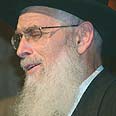
Rabbi rules against women's prayer quorum
Ramat Gan Chief Rabbi Yaacov Ariel says widespread phenomenon is against Halacha, accuses participating women of withdrawing from society on basis of 'social and feminist considerations'
Women's prayer quorum during the Purim holiday have become in recent years a widespread phenomenon in many religious communities in Israel, but a new Jewish ruling considers them illegal and forbidden.
Chief Ramat Gan Rabbi Yaakov Ariel stated that "to begin with, forming a women's prayer quorum is against the Halacha," and accused the participating women of withdrawing from society on the basis of "social and feminist considerations".
Rabbi Ariel, who is one of the leaders of Religious Zionism and a senior arbiter, warned against the phenomenon Thursday during an interview with Arutz Sheva (Channel Seven) and claimed the it is "not right" and "forbidden."
According to Ariel, "it's good that women want to be involved, but if a woman wants to be more god-fearing and pray in a quorum – she should do so in a men's quorum. The Torah did not command women to pray in a quorum," he added.
The rabbi did agree however that "if the husband was in the synagogue and the woman was looking after the children, she can go to a second quorum to listen to the reading of the Book of Esther, and if there is no man present – she may read it herself."
Religious women's organization Kolech criticized Rabbi Ariel's ruling. A spokeswoman for the organization told Ynet: "The Halacha states that a woman may fulfill the duty of prayer for another woman. The same ruling was also stated in the Shulchan Aruch (book of religious law from the Rabbi Yosef Karo), by Rabbi Ovadia Yosef and more.
"In accordance with these rulings, women public reading of the Book of Esther became popular and widespread in many national- religious communities and most women who take part in them do not consider themselves feminist," she added.
Rabbi Yaacov Ariel has been known to rule on many issues that combine the Torah and Halacha with modern-day living, however on issues that are considered feminist he tends to rule more strictly and avoids making progressive and bold decisions.
Rabbi Ariel has gained popular support from the religious public that is often credited to his choice not to deal with or express his opinion on political issues.
Rabbi Ovadia Yosef, on the other hand, is considered to be more lenient on women's matters and ruled last year that a woman can fulfill the duty of praying for a man as well as a woman. He explained his ruling by saying that both genders are equally obliged to commit the mitzvah of prayer.










